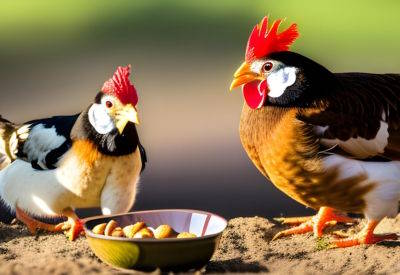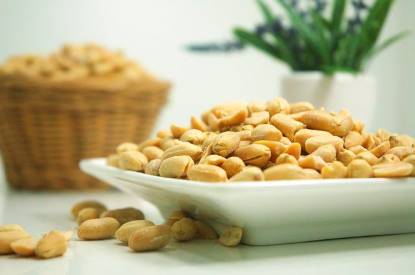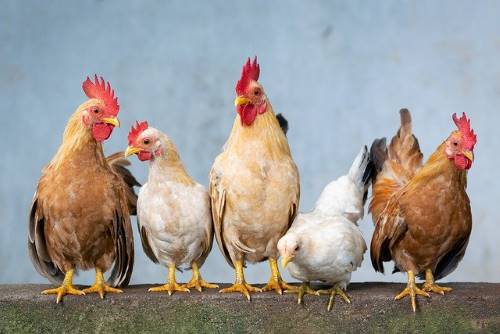Have you ever sat down with a handful of nuts, enjoying the crunch and flavor, and found yourself eye-to-eye with your feathered friends in the backyard, wondering, can chickens eat nuts? I’ve been there, too! As a backyard chicken owner, I’m always looking for new, nutritious treats to spoil my clucking pals. After all, variety is the spice of life, right?
Well, I’m here to answer that burning question once and for all: yes, chickens can eat nuts! But, like all things in life, there’s a bit more to it than a simple yes or no. Just because they can, does it mean they should? And if they should, which ones are the best for them, and how should they be prepared? As it turns out, the world of chickens and nuts is as varied and interesting as the nuts themselves.
In this article, we will crack open the topic of chickens and nuts. From the nutritional requirements of chickens to the potential health benefits of nuts, we’ll explore which nuts are safe, which ones to avoid, and how best to incorporate these tasty morsels into your chickens’ diet. So, let’s get clucking and see how we can add a little nutty flair to our chickens’ meals!

The Nutritional Requirements of Chickens
A balanced chicken diet is akin to a delicate seesaw – everything should be in perfect equilibrium. It’s not just about filling their bellies, but also ensuring they’re getting the right nutrients. Essential elements like proteins, carbohydrates, fats, vitamins, and minerals are vital in keeping your feathered friends healthy.
Proteins, for example, are crucial for growth, egg production, and general health. Vitamins A and E help with eye health and antioxidant protection, while B vitamins support metabolism. Minerals like calcium are indispensable for robust eggshells. It’s a real team effort!
[ChickenAffiliate]
Unpacking the Health Benefits of Nuts for Chickens
Nuts, by their very nature, are densely packed with many nutrients. They’re like tiny treasure chests brimming with good stuff that can contribute positively to the health of your chickens. Let’s break this down.
A Protein-Packed Treat
One of the standout qualities of nuts is their high protein content. Proteins are essential for chickens as they support growth, feather health, and egg production. Offering your chickens a protein-packed nutty treat can aid in maintaining their overall health and productivity.
Healthy Fats for Energy
Nuts are also high in healthy fats. Before you raise an eyebrow at the word ‘fat,’ remember that not all fats are created equal. The monounsaturated and polyunsaturated fats found in nuts benefit chickens, providing a concentrated energy source. This is especially important when chickens need extra calories to stay warm during colder months.
Micronutrients: The Hidden Gems
Beyond proteins and fats, nuts are also rich in essential vitamins and minerals, often called micronutrients. These include vitamins E and B and minerals like magnesium and phosphorus. These micronutrients contribute to various bodily functions in chickens, from boosting immune health to supporting metabolism and bone health.
Fiber for Digestive Health
Nuts also contain fiber, which aids in digestion. While chickens don’t require a significant amount of fiber in their diet, it does help keep their digestive system running smoothly, ensuring they extract as much nutritional goodness from their feed as possible.
Can Chickens Eat Nuts: Unveiling the Myth
There’s been a lot of clucking in the coop about whether chickens can eat nuts. You might’ve heard a few henhouse rumors yourself. But let’s set the record straight: chickens can eat nuts! And not just that, they can benefit from the nutritious punch that nuts provide.
Numerous studies have shown that poultry can digest nuts well and benefit from their nutrient content. So, if you’ve got some leftover nuts from your last holiday party, feel free to share the bounty!
A Nutty Menu: Identifying the Safe Nuts for Chickens

Knowing that chickens can safely enjoy nuts is one thing, but understanding which nuts they can munch on is another. Let’s look at five common nuts that can safely be included in your chickens’ diet, each with its unique nutritional profile and benefits.
Peanuts: A Protein Powerhouse
Peanuts, while technically legumes, are often grouped with nuts due to their similar nutrient profile. They are a rich protein source, essential for chickens’ growth, feather health, and egg production. Just ensure that any peanuts you offer are unsalted and uncoated.
Read More: Can Chickens Eat Peanuts? Nutritional Benefits & Feeding Guidelines
Walnuts: Omega-3 Bonanza
Walnuts are a fantastic source of Omega-3 fatty acids, which play a crucial role in maintaining healthy skin and feathers and supporting overall cellular health. Crushed walnuts can be a great addition to your chickens’ diet.
Read More: Can Chickens Eat Walnuts? Nutritional Benefits & Risks Explained
Almonds: Vitamin E Galore
Almonds are brimming with vitamin E, a powerful antioxidant that helps protect cells from damage. They also have a good amount of protein and healthy fats. Remember to serve almonds in moderation due to their high fat content.
Read More: Can Chickens Eat Almonds? Uncovering The Truth
Pecans: Fiber and Antioxidants
Pecans are another nutty treat chickens can enjoy. Packed with fiber, they support healthy digestion in chickens. Pecans are also high in antioxidants, which can help protect your chickens from disease.
Read More: Can Chickens Eat Pecans? A Guide For A Healthy Flock
Pistachios: A Nutrient-Dense Snack
Pistachios, with their distinct flavor, are loved by humans and can be a delightful treat for chickens. They’re packed with vital nutrients like proteins, healthy fats, and antioxidants. Like with the other nuts, ensure the pistachios are unsalted and shelled before offering them to your chickens.
Read More: Can Chickens Eat Pistachios? A Surprising Snack Guide
These five nuts can be a valuable addition to your chickens’ diet, providing an array of essential nutrients. Remember to serve them in a manner that’s safe for chickens – unsalted, uncoated, and properly crushed or chopped.
Types of Nuts Chickens Should Avoid
While we’re on the subject, knowing that some nuts are a no-go is essential. For example, raw, uncooked red kidney beans can be toxic to chickens. They contain a harmful substance called phytohaemagglutinin.
Also, avoid giving your chickens any seasoned or salted nuts. Too much salt can harm chickens and lead to salt poisoning. And remember, some commercially available mixed nuts might have additives or coatings, so it’s always best to check the labels.
Practical Guide to Feeding Nuts to Chickens

Now that we’ve identified which nuts your chickens can safely enjoy, let’s discuss the practical aspects of feeding these to your flock. After all, how we feed our feathered friends is just as important as what we feed them.
Feeding Frequency and Quantity: Moderation is Key
First things first: nuts should be fed to chickens in moderation. Think of them as a supplement, not a replacement for their regular diet. A small handful of nuts per chicken once or twice a week should suffice. Remember, too much of a good thing can tip the balance of their diet and may lead to health issues like obesity.
Preparation: Safety Comes First
Before feeding nuts to your chickens, it’s essential to prepare them correctly. Whole nuts can be a choking hazard, so crushing or chopping them into smaller pieces is best. Also, ensure that the nuts you’re feeding are unsalted and uncoated. Excess salt and additives can be harmful to chickens.
Observation: Keeping an Eye on Your Flock
Once you start introducing nuts into your chickens’ diet, monitor your flock closely. Look for changes in their behavior, droppings, or egg production. These could signal potential allergic reactions or health issues. If you notice any adverse effects, it’s best to remove nuts from their diet and consult a veterinarian.
Storing Nuts for Your Chickens: Best Practices

Like the food we consume, the quality of the nuts we feed our chickens can significantly impact their health. Proper storage is crucial to maintaining the nutritional value of the nuts and preventing them from becoming spoiled or rancid. Here are some best practices for storing nuts for your chickens.
Keep It Cool and Dry
Nuts should be stored in a cool, dry place. Heat and moisture can cause nuts to spoil faster. A pantry or cabinet in a temperature-controlled room could be ideal.
Airtight Containers are Your Friend
When it comes to storing nuts, airtight containers are a must. They protect the nuts from air and moisture and keep them safe from insects and other pests. Glass or plastic containers with tight-fitting lids are excellent choices.
Avoid Sunlight
Direct sunlight can speed up the degradation process of the nuts. It’s best to store your nuts in a dark place or use opaque containers to block out the light.
Buy in Reasonable Quantities
While buying in bulk can be cost-effective, nuts have a shelf life. Consider how frequently you feed nuts to your chickens and buy quantities that can be used within a few months. This ensures the nuts stay fresh and nutritious.
Check Regularly
Make it a habit to inspect the nuts regularly. Look for signs of spoilage, such as a change in smell, color, or texture. If you come across any spoiled or moldy nuts, remove them immediately to prevent the spread of mold to other nuts.
Remember, the goal is to provide your chickens with high-quality, nutritious food. Storing nuts properly ensures that your chickens get the most out of these nutrient-dense treats.
Adding a Twist: Fun Ways to Feed Nuts to Chickens
Feeding time can be more than just a routine; it can be a fun and engaging activity for you and your flock. Here are some creative ways to add a twist to feeding nuts to your chickens and turn it into an enriching experience.
Nutty Treat Ball
Purchase a chicken treat ball or any small, hollow ball with holes. Fill it with crushed nuts, and let your chickens have a ball! They’ll have fun pecking at the ball and be rewarded with delicious nutty morsels.
Hide and Seek with Nuts
Hide small amounts of crushed nuts around the chicken run or coop. Chickens are natural foragers and will love the challenge of hunting for these hidden treats. It’s a great way to keep them entertained and active.
Mix It Up in Their Favorite Treats
Blend some crushed nuts into your chickens’ favorite treats or foods. Whether mixed into a mash, scrambled eggs, or fresh vegetables, the added crunch and flavor will be a pleasant surprise for your flock.
Nutty Ice Blocks for Summer
Keep your chickens cool and entertained on hot summer days by freezing crushed nuts in water inside a shallow dish or ice cube tray. As the ice melts, the chickens will enjoy pecking at the nuts. It’s a refreshing and nutritious way to beat the heat!
Create a Nutty Pecking Ladder
String up a row of whole nuts (make sure they are safe sizes to prevent choking) and hang it in your coop. Chickens will enjoy the challenge of pecking at this nutty ladder, and it’s a great way to keep them busy.
Remember, variety is the spice of life, and these fun feeding methods can keep your chickens engaged, active, and happy. Always supervise new activities to ensure they are safe and enjoyed by your flock. Happy feeding!
Can chickens eat nuts – final thoughts
In summary, we’ve established that chickens can indeed eat nuts. Nuts like almonds, peanuts, walnuts, and pecans can serve as a nutritious supplement to a chicken’s diet, providing vital proteins, healthy fats, and micronutrients. However, it’s crucial to remember moderation, ensuring nuts remain an occasional treat rather than a staple. Avoid potentially harmful nuts such as raw kidney beans or overly salted ones.
So, the next time you find yourself with a handful of nuts, consider sharing a few with your chickens. Maintaining a diverse and balanced diet contributes to your chickens’ overall health and wellness, promoting a thriving coop environment.
Related Articles:
